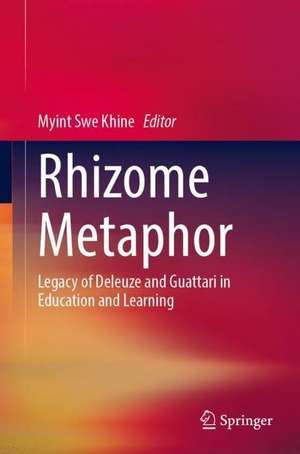Rhizome Metaphor: Legacy of Deleuze and Guattari in Education and Learning
Editat de Myint Swe Khineen Limba Engleză Hardback – 2 iun 2023
- What is the conception of rhizomatic learning and nomadic pedagogy?
- In which ways can rhizomatic learning transform teaching methods in the digital era? How can educators implement a rhizomatic learning approach in practice?
Combining theory and practice, this book is essential reading for educational policymakers, teacher educators, university faculty, researchers, instructional designers, learning technologists, teachers, and undergraduate and graduate students worldwide.
Preț: 892.28 lei
Preț vechi: 1088.15 lei
-18% Nou
Puncte Express: 1338
Preț estimativ în valută:
170.73€ • 179.22$ • 141.71£
170.73€ • 179.22$ • 141.71£
Carte tipărită la comandă
Livrare economică 10-24 aprilie
Preluare comenzi: 021 569.72.76
Specificații
ISBN-13: 9789811990557
ISBN-10: 9811990557
Pagini: 202
Ilustrații: XI, 202 p. 41 illus., 29 illus. in color.
Dimensiuni: 155 x 235 mm
Greutate: 0.48 kg
Ediția:2023
Editura: Springer Nature Singapore
Colecția Springer
Locul publicării:Singapore, Singapore
ISBN-10: 9811990557
Pagini: 202
Ilustrații: XI, 202 p. 41 illus., 29 illus. in color.
Dimensiuni: 155 x 235 mm
Greutate: 0.48 kg
Ediția:2023
Editura: Springer Nature Singapore
Colecția Springer
Locul publicării:Singapore, Singapore
Cuprins
Chapter 1. Rhizomatic learning and digital pedagogies.- Chapter 2. Rhizomatic approach to building a territorial identity.- Chapter 3. Applying Deleuzian and Guattarian principle of 'a-signifying rupture' to students' online rhizomatic engagement patterns.- Chapter 4. The autonomous learner: Rhizomatic learning in professional learning contexts.- Chapter 5. Student teachers' art-informed learning as rhizomatic formations in primary teacher education: An exploratory approach.- Chapter 6. Rhizomatic learning: A critical appraisal.- Chapter 7. Becoming learners in laboratories of learning: A rhizomatic assemblage of Nomadic pedagogies.- Chapter 8. Rhizome and Nomadology: A blended conceptual metaphor framework for the post[1]digital 21st-century education.- Chapter 9. Rhizomatic learning in the postmodern era.- Chapter 10. Toward a rhizomatic international studies.- Chapter 11. Rhizomatic learning environments: Possibilities for education.- Chapter 12. Changing the image of thought: Rhizomatic learning in the Anthropocene.
Notă biografică
Myint Swe Khine teaches at Curtin University, Australia. He has more than 30 years of experience in teacher education. He received Master's degrees from the University of Southern California, USA, University of Surrey, UK, and the University of Leicester, UK, and a Doctoral degree from Curtin University, Australia. He worked at the National Institute of Education, Nanyang Technological University, Singapore, and was a Professor at Emirates College for Advanced Education in the United Arab Emirates. He has wide-ranging research interests in teacher education, science education, learning sciences, psychometrics, measurement, assessment, and evaluation. He is a member of the Editorial Advisory Board of several international academic journals. Throughout his career, he has published over 40 edited books. These include Large Scale School Reform and Social Capital Building (Routledge, 2013), Emerging Trends in Learning Analytics (Brill, 2019), Contemporary Perspectives on Research in Educational Assessment (Information Age Publishing, 2020), Rasch Measurement: Applications in Quantitative Educational Research (Springer, 2020), Academic Self-efficacy: Nature, Assessment & Research (Springer, 2022), and Handbook of Research on Teacher Education: Innovations and Practices in Asia (Springer, 2022).
Textul de pe ultima copertă
This comprehensive volume highlights the paradigm shift, creative approaches, and theoretical and practical aspects of rhizomatic learning. The great French theorists Deleuze and Guattari introduced the concept of the rhizome to allow educators to explore the educative process with the rhizomatic lens. The chapters cover digital pedagogies, the conceptual framework of rhizome and nomadic pedagogy in 21st-century education. It creates rhizomatic learning environments and rhizome metaphors to illuminate learning and teacher professional development. It covers an extensive range of issues and challenges related to teaching and learning in the techno centric education systems. It presents an up-to-date and comprehensive analysis of rhizomatic learning approaches in various disciplines. It examines the following key questions:
Combining theory and practice, this book is essential reading for educational policymakers, teacher educators, university faculty, researchers, instructional designers, learning technologists, teachers, and undergraduate and graduate students worldwide.
- What is the conception of rhizomatic learning and nomadic pedagogy?
- In which ways can rhizomatic learning transform teaching methods in the digital era? How can educators implement a rhizomatic learning approach in practice?
Combining theory and practice, this book is essential reading for educational policymakers, teacher educators, university faculty, researchers, instructional designers, learning technologists, teachers, and undergraduate and graduate students worldwide.
Caracteristici
A unique book with emergent findings from diverse thinkers and practitioners from the teaching profession Examines recent development and research on rhizomatic learning Presents an up-to-date and comprehensive analysis of the rhizomatic learning approach in various disciplines
